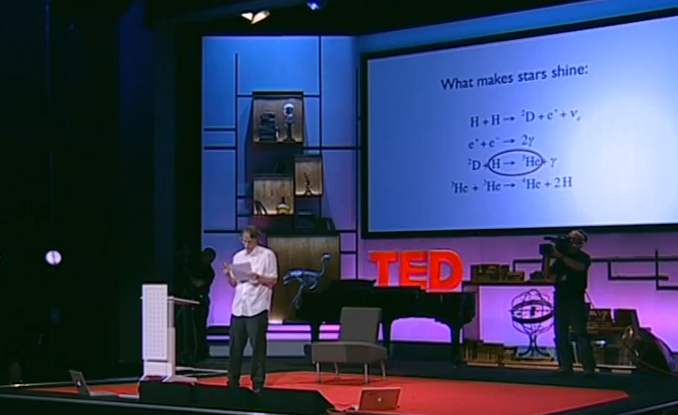(单词翻译:单击)
演讲文本
That all that, discovered in 40 years,
这40年中的所有发现
had not been in the previous hundred thousand,
是数千年来所未有的
was not for lack of thinking about stars, and all those other urgent problems they had.
而这可不能归结为古人思维懒惰,对星星啊,还有那些迫切的问题不闻不问
They even arrived at answers, such as myths,
他们不光思考了,还给出了答案,比如说神话
that dominated their lives,
可虽说神话统治了古人的生活,包罗万象
yet bore almost no resemblance to the truth.
却与真正的现实几乎搭不上边
The tragedy of that protracted stagnation isn't sufficiently recognized, I think.
这种长期认知停滞所造成的悲哀,我觉得,并没有被古人足够重视
These were people with brains of essentially the same design
古人们的大脑和我们的这些发现了种种新知识的大脑
that eventually did discover all those things.
实质上没有分别

But that ability to make progress remained almost unused,
但是其中那个用来产生进步的潜力始终几乎没有被利用
until the event that revolutionized the human condition and changed the universe.
直到有一件事彻底更新了人们的生活状态,改天换地
Or so we should hope.
至少我们希望情况是这样的
Because that event was the Scientific Revolution,
这个大事件就是科学革命
ever since which our knowledge of the physical world,
从那以后我们对于物质世界的认知
and of how to adapt it to our wishes, has been growing relentlessly.
和对如何根据我们的意愿改造它的了解,就一个劲地增长着
Now, what had changed?
现在想想,到底是发生了什么变化呢?
What were people now doing for the first time that made that difference
当时人们究竟初次尝试了什么
between stagnation and rapid, open-ended discovery?
就打破了僵局,开始了快速而无休无止的发现之旅?
How to make that difference is surely the most important universal truth that it is possible to know.
这一僵局的打破肯定是一个极为重要的广泛真理,而我们是可以了解它的
Worryingly, there is no consensus about what it is.
让人担忧的是,对它究竟是怎么做到的人们众说纷纭
So, I'll tell you.
我这就来说说我的解释
But I'll have to backtrack a little first.
但先得稍稍回顾一下
Before the Scientific Revolution,
在科学革命发生之前
they believed that everything important, knowable, was already known,
古人相信一切重要而可知的事物都已经被了解了
enshrined in ancient writings, institutions,
这些知识被高高供起在古籍里,经院中
and in some genuinely useful rules of thumb
还在日常生活的惯用窍门中被深信不疑
which were, however, entrenched as dogmas, along with many falsehoods.
而这些窍门,和许多谬论一同都成了根深蒂固的教条
So they believed that knowledge came from authorities that actually knew very little.
那时人们相信知识来自权威,这些权威其实知道的不多
And therefore progress
所以知识的进步
depended on learning how to reject the authority of learned men, priests, traditions and rulers.
取决于学会如何摈弃学究,教士,传统习惯和统治者们的权威
Which is why the Scientific Revolution had to have a wider context.
这就是为什么科学革命必须有一个大背景
The Enlightenment, a revolution in how people sought knowledge, trying not to rely on authority.
那就是启蒙运动对于求知方法的一场革命,试着摆脱对权威的依赖
"Take no one's word for it."
“切勿轻信人言”
But that can't be what made the difference.
可这还不够
Authorities had been rejected before, many times.
历史上摈弃权威的例子比比皆是
And that rarely, if ever, caused anything like the Scientific Revolution.
而这些事件的结果却很难,或根本不能,与科学革命同日而语
视频及简介
演讲简介:
上古的数万年间我们的祖先通过神话来理解世界,他们认知的发展十分缓慢,而科学认知的兴起仅用几个世纪就在世界上产生了翻天覆地的变革。欲知其因,请看物理学家大卫·多伊奇的精妙分析。


